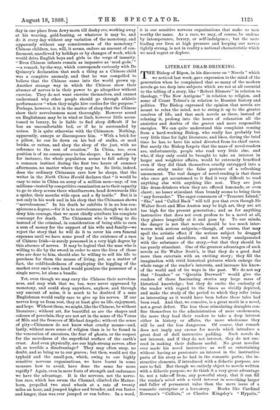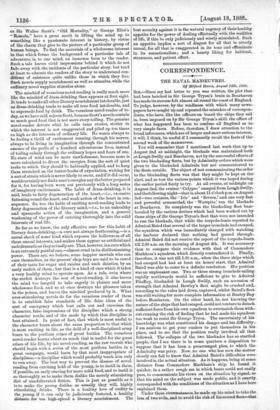LITERARY DRAM-DRINKING.
THE Bishop of Ripon, in his discourse on " Novella " which
we noticed last week, gave expression to the mind of the generation when he complained that so many of the modern novels go too deep into subjects which are not at all essential to the telling of a story, like "Robert Elsmere " in relation to theology, "The New Antigone" in relation to religion, and some of Count Tolstoi's in relation to Russian history and politics. The Bishop expressed the opinion that novels are meant to relax the mind, not to string it up to the greater resolves of life, and that such novels as these, instead of relaxing it, prolong into the hours of relaxation all the anxieties and doubts of the graver and more responsible energies. We can quite understand this complaint coming from a hard-working Bishop, who really has probably but very little time for light literature, and likes, during the brief time he has, to have his mind diverted from its chief cares. But surely the Bishop forgets that the mass of novel-readers are, unfortunately, people who read very little else, and who, if they only could be brought to take an interest in larger and weightier affairs, would be extremely benefited even if they did think themselves cruelly entrapped into a serious study under the false pretence of a refreshing amusement. The real danger of novel-reading is that those who once get accustomed to it find it very difficult to read anything else with anything like zest. They are just like dram-drinkers when they are offered lemonade, or even claret ; no lesser stimulant than brandy seems to bring them "any forrarder." The eager consumers of "Treasure Island," "She," and "Called Back" will tell you that even though Sir Walter Scott and Miss Austen may be high art, they are art too high for the present generation ; and as for anything instructive that does not even profess to be a novel at all, they glance languidly at it and pass by. To our minds, the danger is not that novels should be too much inter- woven with serious subjects,—though, of course, that may spoil the artistic effect if the serious subject be dragged in by head and shoulders, and not truly amalgamated with the substance of the story,—but that they should be too purely stimulant. One of the greatest advantages of such novels as Sir Walter Scott's, is that they do a good deal more than entertain with an exciting story ; they fill the imagination with vivid historical pictures which enlarge the whole range of the reader's interests, and increase his know- of the world and of its ways in the past. We do not say that " Ivanhoe " or "Quentin Durward" would give the readers of those fascinating stories any large mass of historical knowledge, but they do excite the curiosity of the reader with regard to the times so vividly depicted, and make the study of the period to which they refer twice as interesting as it would have been before these tales had been read. And that, we conceive, is a great merit in a novel, not a great defect. The less these stimulating draughts con- fine themselves to the administration of mere excitements, the more they lead their readers to take a deep interest either in history or affairs, the more wholesome they will be and the less dangerous. Of course, that remark does not imply any excuse for novels which introduce a great deal of dull instructive padding. Such novels do not interest, and if they do not interest, they do not suc- ceed in making their dullness useful. No great novelist ever made his novel instructive as well as entertaining without having as passionate an interest in the instructive parts of his story as he had in the romantic parts ; the in- structive elements, if introduced with a didactic purpose, are sure to fail. But though we entirely object to novels written
with a didactic purpose, we do think it a very great advantage to, not a take-off from, any powerful story, that it can fill the reader's mina with n. Yirid interont in something larger and fuller of permanent value than the mere issue of a romantic enterprise or a love-story. Books like Cardinal Newman's " Callista," or Charles Kingsley's " Hypatia,"
or Sir Walter Scott's "Old Mortality," or George Eliot's " Romola," have a great merit in lifting the mind up to something like a passionate interest in history, by virtue of the charm they give to the picture of a particular group of human beings. To find the materials of a wholesome interest in that which forms the background of a particular tale of adventure; is, to our mind, an immense boon to the reader. Such a tale leaves vivid impressions behind it which do not fade away with the incidents of the particular story, but tend at least to educate the readers of the story to understand con- ditions of existence quite unlike those in which they live. Such novels supply nourishment as well as stimulus, while the ordinary novel supplies stimulus alone.
The mischief of voracious novel-reading is really much more like the mischief of dram-drinking than appears at first sight. It tends to make all other literary nourishment intolerable, just as dram-drinking tends to make all true food intolerable, and to supersede food by drink. The voracious novel-reader of to- day, as we have said, rejects Scott, because Scott's novels contain so much good food that is not mere story-telling. The genuine novel-reader detests what he calls tame stories, stories in which the interest is not exaggerated and piled up ten times as high as the interests of ordinary life. He wants always to be feeling a thrill of excitement running through his nerves, always to be living in imagination through the concentrated essence of the perils of a hundred adventurous lives, instead of toiling calmly through the ordinary hopes and fears of one. No state of mind can be more unwholesome, because none is more calculated to divert the energies from the sort of quiet tasks to which they should be habitually applied, and to keep them stretched on the tenter-hooks of expectation, waiting for a sort of strain which is never likely to occur, and if it did occur, would certainly not find a man's energies any thebetter prepared for it, for having been worn out previously with a long series of imaginary excitements. The habit of dram-drinking, it is said, leads to fatty degeneration of the heart,—i.e., excessive fattening round the heart, and weak action of the heart in con- sequence. So, too, the habit of exciting novel-reading leads to fatty degeneration of the literary mind,—i.e., to an unhealthy and spasmodic action of the imagination, and a general weakening of the power of entering thoroughly into the solid interests of real life.
.So far as we know, the only effective cure for this habit of literary dram-drinking,--a cure not always forthcoming,—is a moral shock of some kind which exposes the hollowness of all these unreal interests, and makes them appear as artificial and melodramatic as they actually are. That, however, is a cure which is an extremely painful one,—almost cruel baits disillusionisirig power. There are, we believe, some happier mortals who can cure themselves, as the grocers' shop-boys are said to be cured of their taste for sugar and raisins and such dainties, by an early surfeit of them ; but that is a kind of cure which it takes a very healthy mind to operate upon. As a rule, even where the surfeit destroys the zest of novel-reading, it also leaves the mind too languid to take eagerly to plainer and more wholesome food, and so at once destroys the pleasure taken in the poison, and leaves the mischief produced by it. What over-stimulating novels do for the voracious reader of 'them is to establish false standards of life, false ideas of the sort of emergency which best calls out and exercises the character, false impressions of the discipline which a strong character needs, and of the mode by which that discipline is best attained. In point of fact, that which is most useful to the character bears about the same proportion to that which is most exciting in life, as the drill of a well-disciplined army bears to the perilous crises of great battles. The voracious novel-reader learns about as much that is useful for the great crises of his life, by his novel-reading, as the raw recruit who should begin with a series of the most perilous battles in a great campaign, would learn by that most inappropriate of disciplines,—a discipline which would probably teach him only to run away. The best way to prevent the disease of novel- reading from catching hold of the young, is to instil in them, if possible, an early craving for more solid food, and to instil it so thoroughly as to make them dislike the merely stimulating diet of unadulterated fiction. This is jest as possible as it is to make the young dislike, as usually they will, highly stimulating drinks. There is a healthy love of reality in the young, if it Can only be judiciously fostered, a healthy distaste for too high-spiced a literary nourishment. The
best security against it is the natural urgency of their healthy appetite for the power of dealing effectually with the realities of life, if this be only judiciously and wisely stimulated.. Such an appetite implies a sort of disgust for all that is utterly unreal, for all that is exaggerated in its tone and efreminate in its sensationalism ; and a hearty liking for habitual, strenuous, and patient effort.



































 Previous page
Previous page